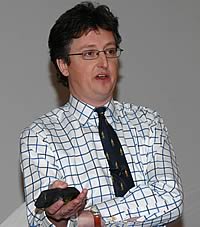The Arable Group’s (TAG) 2005 biannual conference on Wednesday (February 9) at the Scotch Corner Hotel, dedicated to questioning the implications of the Mid Term Review changes for arable farmers, was attended by 170 delegates.
TAG conference 2005
 |
An arable farm supporting two families would need to make a £50,000 net profit to meet their drawings, Richard Crane, of accountants Deloitte and Touche told the conference.
Mr Crane gave an example of two families living off the business – one working on the properties or diversification side and the other on the arable business each drawing £2,500 per calendar month.
With cost and tax deductions, the business would need to generate profits of £50,000 from growing food.
With the Single Farm Payment, less costs, to be used for environmental activities at £50 an acre this would necessitate a 1,000 acre owner-occupied farm – potentially 2,500 acres of rented land.
“If we take our production for 2005 on a similar basis to 2004 and we pull out the £200 ha from the SFP, the actual money that most people will have made from growing crops is negligible. Most of us must change the way we grow crops,” said Mr Crane.
Over the last decade, with the exception of 2003 which was a good year, threequarters of arable businesses had not produced money from growing food.
The MTR should be a time to stimulate producers into looking at what they were doing more closely and to encourage them to make change.
“There are a lot of ‘fundamentalist farmers’ who will carry on irrespective or rational or logical reasons but the MTR will result in a smaller and simpler industry – it’s a question of seeing the wood for the trees. The bigger picture is making sure the overall business is working well for you and the family involved with it,” said Mr Crane.
He said there was a “woeful” lack of good management records kept which was inexcusable.
“You need to know the net cost of production of individual crops. You have got the tools but it needs the application and reporting,” he said.
As well as record keeping, other key issues to address included sorting out the management of the farm.
Where different generations of one family were involved in running the business it had its strengths, but it also had its weaknesses. It was important to allow the person who was managing the arable side of the business to have a free rein.
“Those people who are moving their businesses forward will have skills, stamina and scale. There are innovators coming through – just decide you want to be one of them,” said Mr Crane.
He said there were some income tax points to come out of the new scheme, although these had not yet been agreed.
The important thing was to get the business’s profit generation sorted out and not to let the tax tail wag the dog.
One area of debate on taxation was the liability of capital gains tax on land used for biofuel production.

